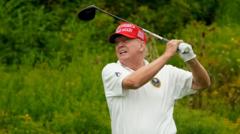As the deadline for President Trump's new tariffs approaches, Vietnam appears vulnerable but seeks to engage the US with a blend of diplomacy and trade concessions.
**Can Vietnam Navigate Trump's Tariffs with Diplomacy?**

**Can Vietnam Navigate Trump's Tariffs with Diplomacy?**
In response to new tariff threats, Vietnam's Prime Minister proposes a unique diplomatic strategy involving golf with Trump.
Vietnam's Prime Minister Pham Minh Chinh has recently suggested he would be willing to "golf all day long" with President Donald Trump to foster a favorable relationship amid looming tariffs. This comes as Trump prepares to unveil reciprocal tariffs, following recent import taxes targeting foreign automakers. With Vietnam's major trade deficit with the US, analysts express concerns about the country's ability to sidestep the repercussions of these new levies.
While certain nations have reacted against Trump's plans, Chinh's light-hearted approach reflects a strategy reminiscent of former Japanese Prime Minister Shinzo Abe, who cultivated a friendship with Trump through golf. However, some experts remain skeptical about Vietnam receiving any preferential treatment, as Trump's hardline stance on trade takes precedence.
Vietnam, having previously profited from businesses relocating from China to dodge previous tariffs, is striving to maintain strong ties with the US. The current government has noted its commitment to avoiding trade restrictions, having recently granted SpaceX's Starlink a trial run within its borders and announced plans to lower tariffs on specific US imports, such as energy and vehicles.
This moves align with Vietnam's diplomatic philosophy of "bamboo diplomacy," emphasizing adaptability amidst foreign pressures. Analysts suggest that in response to increased US scrutiny, Vietnam might offer to enhance investments in various sectors or consider access to rare earth minerals, mitigating potential tariff impacts.
China's substantial influence as both a supplier and investor in Vietnam complicates the situation. Nearly a third of Vietnam's imports come from China, and the US is wary of potential "trans-shipments" of Chinese goods passing through Vietnam. As tensions between the US and China continue, further tariffs on Vietnam could significantly affect American firms like Apple and Nike, which have relocated production there.
With an uncertain future ahead, Chinh remains optimistic about managing Vietnam's relationship with the US. The forthcoming implementation of Trump's tariffs will serve as a crucial test for Vietnam's diplomatic approach and its ability to navigate this international trade landscape. As the world watches, it’s unclear if diplomacy on the golf course will yield the desired results for Vietnam amidst a challenging economic backdrop.
While certain nations have reacted against Trump's plans, Chinh's light-hearted approach reflects a strategy reminiscent of former Japanese Prime Minister Shinzo Abe, who cultivated a friendship with Trump through golf. However, some experts remain skeptical about Vietnam receiving any preferential treatment, as Trump's hardline stance on trade takes precedence.
Vietnam, having previously profited from businesses relocating from China to dodge previous tariffs, is striving to maintain strong ties with the US. The current government has noted its commitment to avoiding trade restrictions, having recently granted SpaceX's Starlink a trial run within its borders and announced plans to lower tariffs on specific US imports, such as energy and vehicles.
This moves align with Vietnam's diplomatic philosophy of "bamboo diplomacy," emphasizing adaptability amidst foreign pressures. Analysts suggest that in response to increased US scrutiny, Vietnam might offer to enhance investments in various sectors or consider access to rare earth minerals, mitigating potential tariff impacts.
China's substantial influence as both a supplier and investor in Vietnam complicates the situation. Nearly a third of Vietnam's imports come from China, and the US is wary of potential "trans-shipments" of Chinese goods passing through Vietnam. As tensions between the US and China continue, further tariffs on Vietnam could significantly affect American firms like Apple and Nike, which have relocated production there.
With an uncertain future ahead, Chinh remains optimistic about managing Vietnam's relationship with the US. The forthcoming implementation of Trump's tariffs will serve as a crucial test for Vietnam's diplomatic approach and its ability to navigate this international trade landscape. As the world watches, it’s unclear if diplomacy on the golf course will yield the desired results for Vietnam amidst a challenging economic backdrop.






















